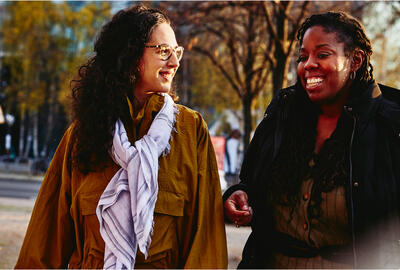Randstad Canada is committed to supporting Indigenous communities, and we encourage people to continue learning about Indigenous history.
As Canada turns 156 since confederation, we have decided to turn the spotlight around and highlight female Indigenous Canadian leaders who have made meaningful contributions to Canadian society and the world of work.
Let’s take a trip through Canada’s past and present to recognize and learn more about these trailblazing indigenous women.
kenojuak ashevak (1927 - 2013) - celebrated inuk artist
Kenojuak Ashevak is one of Canada’s most celebrated Inuit artists, famous for her bold compositions that define the Cape Dorset style.
She is well-known for her works in graphite, coloured pencils, watercolours, acrylics, and other materials.
Her artworks are highly sought-after by museums and collectors, with many of her most famous works appearing in esteemed collections, such as Canada’s National Gallery, the Metropolitan Museum of Arts, The Smithsonian, and the Art Gallery of Ontario.
She was appointed Officer of the Order of Canada in 1967 and promoted to Companion in 1982.
Kenojuak Ashevak was also the first Inuk artist inducted into Canada’s Walk of Fame.
jaime black - métis artist and creator of the redress project
Jaime Black is a Metis multidisciplinary artist-activist best known for creating The REDress project to bring attention to Canada’s missing and murdered Indigenous Women and Girls (MMIWG).
First created in 2010, The REDress Project is an art installation that features red dresses hanging in various public spaces around Canada.
According to Black, she chose the colour red after conversations with an Indigenous friend, who told her red is the only colour the spirits can see.
She explains: "So it’s really a calling back of the spirits of these women and allowing them a chance to be among us and have their voices heard through their family members and community."
As a mentor, Black is also associated with the Mentoring Artists for Women's Art group.
She continues to work in various capacities for groups that focus on education and Indigenous rights.
cindy blackstock (1964 -) - gitxsan activist and academic
Cindy Blackstock is a member of the Gitxsan First Nation and has over 30 years of experience in social work.
Her dedication to child protection and Indigenous children’s rights shaped her career, from her role as the Executive Director of the First Nations Child and Family Caring Society to publishing 75 articles related to First Nations child welfare and human rights.
Blackstock’s most highly recognized work is a 9-year case about Canada's discriminatory funding of child welfare services.
The case was heard before the Canadian Human Rights Tribunal in 2016.
They found that First Nations children were denied the same level and quality of service as children elsewhere in Canada.
This marked a shift in Blackstock’s career, positioning her as a leader for Indigenous children’s rights, equality, and justice.
This famous case is now the subject of a documentary film by Alanis Obomsawin. In 2016, We Can't Make the Same Mistake Twice premiered at the Toronto International Film Festival.
alanis obomsawin (1932 -) - abenaki activist, singer, and artist
Alanis Obomsawin is a celebrated documentary film director, not only in Canada but across the world. Obomsawin began her career as a professional singer and storyteller before joining the National Film Board in 1967.
As a singer, she performed her repertoire of Aboriginal, English, and French songs in North America—on reserves, schools and prisons, music festivals, and television.
Her work as a filmmaker focuses on the lives and perspectives of Indigenous peoples in Canada and their challenges, amplifying voices that have often been excluded.
Obomsawin has won multiple awards and recognitions, including the Governor General’s Award in 1983, an Honorary Fellowship at the Ontario College of Art and Design in 1994, and was named a Companion of the Order of Canada in 2019.
At the 2021 Toronto International Film Festival, a retrospective program of Obomsawsin's films was presented. Obomsawin was named that year's recipient of TIFF's Jeff Skoll Award in Impact Media.
white paper: how to build inclusive workplaces for women
access our white paper on fostering women-friendly workplaces and promoting equity within your organization.
download the white papermary two-axe earley (1911 - 1996) - mohawk and oneida women’s rights activist
Mary Two-Axe Earley was a Mohawk and Oneida women’s rights activist from the Kahnawake reserve in Quebec. After losing her Indian status after marrying, she advocated for changes to the Indian Act.
The act promoted gender discrimination and stripped First Nations women of their rights to participate in the culture of their home reserves after marrying those without status.
In 1967, she established Equal Rights for Indian Women and contributed to the Royal Commission on the Status of Women.
In 1985 the Canadian government passed Bill C-31 to amend the Indian Act, in large part due to Mary’s work.
The bill eliminated gender discrimination from the act and created a new process for allowing First Nations women to have their Indian status reinstated.
Mary became the first woman to have her status reinstated.
jean cuthand goodwill (1928 - 1997) - cree first indigenous woman to complete a nursing program in saskatchewan
Jean Cuthand Goodwill was a Cree nurse who, in 1954, became the first woman to complete a nursing program in Saskatchewan. She was born and raised in the Little Pine First Nation.
When she was young, she contracted tuberculosis and spent three years in a sanatorium, which led her to pursue nursing.
Following graduation, she worked with the Indian and Northern Health Services and La Ronge nursing station, often attending emergencies in remote Northern locations by bush plane or dog sled team.
In 1974, she founded the Inuit Nurses of Canada (now known as the Canadian Indigenous Nurses Association) and, in 1981, was appointed as a special advisor to Canada’s Minister of National Health and Welfare and later the Department of Indian Affairs and Northern Development.
She actively advocated for Indigenous health, joining the Board of Directors for the Canadian Public Health Association and was a founding member of the Aboriginal Women’s Association of Canada.
jas m. morgan - two-spirit indigenous researcher, professor, and writer
Jas M. Morgan is a Cree-Metis-Saulteaux writer and editor. They were the Editor-at-Large for 'Canadian Art' and published their first book, nîtisânak, in 2018.
The book won prestigious awards, including the 2019 Dayne Ogilvie Prize and a 2019 Quebec Writers’ Federation first book prize.
Morgan is also a founder of gijiit, a collective that focuses on community-engaged Indigenous art, gatherings, and research around the themes of gender and sexuality.
They previously worked as editor for mâmawi-âcimowak, an Indigenous art journal.
Their writing has also appeared in GUTS, Malahat Review, Teen Vogue, Room, and several other popular publications.
In 2019 they served as one of the CBC Nonfiction Prize readers and curated the Arts and Literary Magazines Summit.
autumn peltier (2004 -) - anishinaabe indigenous rights advocate
Autumn Peltier is an Anishinaabe Indigenous rights advocate from the Wiikwemkoong First Nation on Manitoulin Island, Ontario, Canada.
Her activism focuses on the importance, sacredness, and accessibility of clean water.
As a leading global youth environmental activist, Peltier was appointed Chief Water Commissioner by the Anishinabek Nation and has spoken about Canada’s water contamination issue at the United Nations.
She was nominated for the International Children’s Peace Prize for three years in a row, in 2017, 2018, and 2019 and was recognized as a “Science Defender” by the Union of Concerned Scientists in 2019.
In 2022, on the eve of National Day for Truth and Reconciliation in Canada, Autumn Peltier's petition asking for clean water solutions was referenced in a Parliamentary House of Commons address and continues to break into conversations as the petition has over 112,000 signatures and continues to grow.
buffy sainte-marie (1941-) - indigenous singer-songwriter and musician
Buffy Sainte-Marie is a renowned singer-songwriter, guitarist, political activist, and visual artist. She primarily uses music to promote awareness of Indigenous community issues.
She is known as being a guiding light for Indigenous resistance.
She has numerous hits, including Universal Soldier, Cod’ine, Until It’s Time for You to Go, and Now That the Buffalo’s Gone.
Her songs have been covered by artists, including Barbara Streisand, Roberta Flack, Janis Joplin, Elvis Prestley, Neil Diamond, and Joe Cocker, among many others.
In 1983, she became the first Indigenous person to win an Oscar for her song Up Where We Belong, written for the film An Officer and a Gentleman.
Sainte-Marie also won a Golden Globe, a BAFTA and an Academy Award for co-writing the hit song “Up Where We Belong.”
She has received the Polaris Music Prize and the Governor General’s Performing Arts Award, as well as multiple Juno Awards, Canadian Aboriginal Music Awards, lifetime achievement awards and honorary degrees.
A Companion of the Order of Canada, she has been inducted into the Canadian Music Hall of Fame, the Canadian Country Music Hall of Fame and Canada’s Walk of Fame.
sheila watt-cloutier (1953-) - inuk activist
Sheila Watt-Cloutier has served as a political representative for Inuit Peoples on various topics.
She’s worked on social and environmental issues that affect Inuit communities, such as pollution and global warming.
In 2005 she turned her attention to the issue of climate change in the Arctic.
Following a report from the Arctic Climate Impact Assessment, she posited that Inuit hunting might not survive sea ice loss and other changes projected in the coming decades.
In December 2005, she and 62 Inuit Hunters and Elders across Canada launched the world’s first international legal action on climate change.
They claimed that the unchecked emissions of greenhouse gases in the U.S. violated Inuit cultural and environmental human rights guaranteed by the 1948 American Declaration of the Rights and Duties of Man.
supporting indigenous workers in canada
Diversity and inclusivity in the workplace should be a priority for every company. Building diverse teams improves the employee experience and increases productivity and decision-making.
Our action starts with a conversation and by challenging our own practices.
Learn more about how Randstad Canada supports indigenous workers in Canada, and find out our action plan in this article.
We’ve also created a case study: how we support indigenous people looking for work.
In this case study, we look at the following:
- how we started an outreach program to hire people in Indigenous communities
- tips for reaching out to Indigenous communities in a respectful manner
- how to build a hiring process and work culture that supports Indigenous people
- a success story about an Indigenous candidate we helped find a job
At Randstad, we are deeply committed to promoting diversity and inclusion in recruitment, ensuring a rich talent pool that reflects the broad spectrum of backgrounds and experiences.
If you are searching for talented candidates from diverse backgrounds, our recruitment team is well-versed in interacting with and respecting this vibrant community.
Reach out to us for your recruitment needs, as we strive to foster an inclusive and equitable hiring process.
white paper: how to build inclusive workplaces for women
access our white paper on fostering women-friendly workplaces and promoting equity within your organization.
download the white paper





